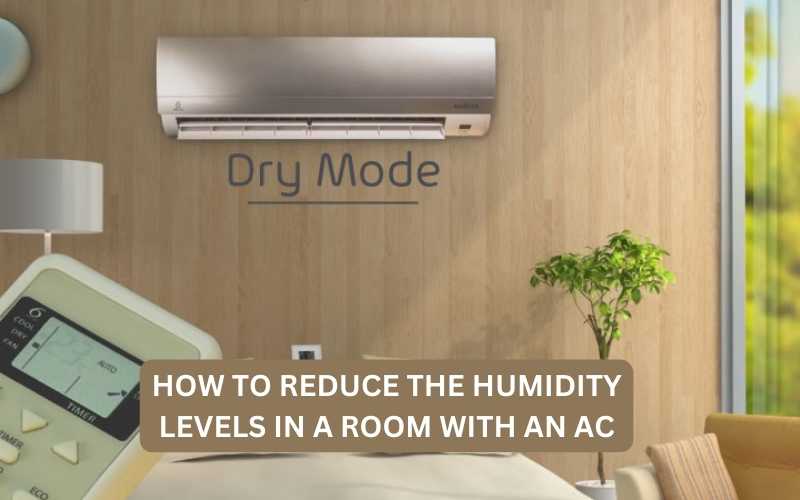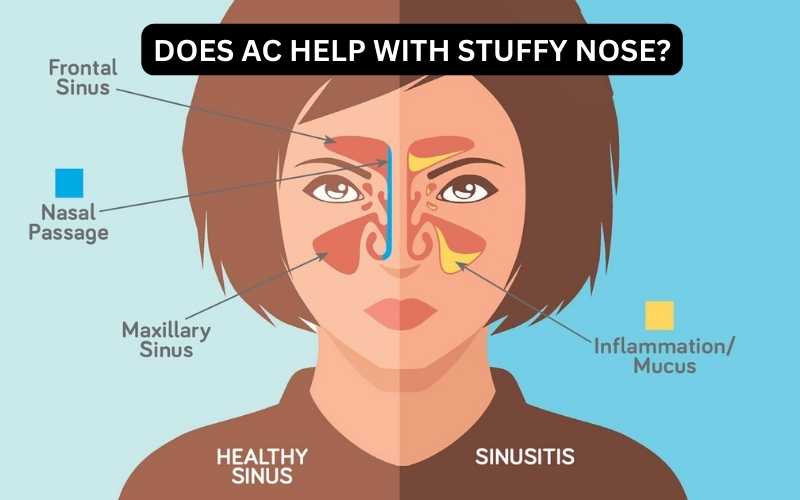There are a few possible reasons why your air conditioner might be causing your nose to feel stuffy. It could be that the air conditioner is drying out the air too much, which can lead to a stuffy nose. It could also be that the air conditioner is circulating dust and other allergens, which can also cause a stuffy nose.
If you have allergies, it’s possible that the air conditioner is triggering them. Finally, it’s possible that the air conditioner is simply cold and is causing your nose to feel stuffy because of the temperature difference. If you’re not sure what the cause is, it’s best to consult with a doctor or an allergist to get to the bottom of it.

Why does the AC make my nose stuffy?
Air conditioners can cause a stuffy nose due to several reasons, including changes in humidity levels, temperature changes, and allergens. Walking into a cold, dry room can trigger a runny nose, just as walking outside on a cold winter day drives many people to reach for tissues.
The cold air seems to trigger nervous system reflexes in the nose that cause glands in the nasal membranes to produce mucus, and this problem may be particularly common in those with allergies.
Air conditioning can also cause sinus congestion in people with allergies, especially to irritants like dust mites, pollen, mold, or other allergens. Additionally, air conditioning acts as a dehumidifier, and your nose might get stuffy if the air is too dry.
In summary, air conditioners can cause a stuffy nose due to changes in humidity levels, temperature changes, allergens, and dry air. People with allergies are more likely to experience sinus congestion due to air conditioning.
How do I stop my nose from getting stuffy with ac on?
To prevent or reduce nasal congestion when using air conditioning, you can try the following strategies:
- Keep the air filters clean: Regularly clean or replace the air filters in your air conditioning unit. This helps to ensure that the air circulating in your space is free from dust, allergens, and other particles that can contribute to nasal congestion.
- Use a humidifier: Add moisture to the air by using a humidifier in the room where the air conditioner is running. This helps to counteract the drying effect of the AC and keeps your nasal passages hydrated.
- Maintain moderate temperature settings: Avoid setting the air conditioner to very low temperatures. Extreme temperature differences between indoor and outdoor environments can lead to nasal congestion. Set the AC to a comfortable temperature that doesn’t cause a sudden shock to your nasal passages.
- Take breaks from the AC: If possible, take short breaks from the air-conditioned environment. This allows your body to adjust to natural temperatures and reduces the strain on your nasal passages. Spending some time in a well-ventilated area or outdoors can provide relief.
- Stay hydrated: Drink plenty of fluids to keep yourself hydrated. Hydration helps to keep your nasal passages moist and less prone to congestion.
- Nasal saline sprays or rinses: Use over-the-counter saline nasal sprays or rinses to moisturize your nasal passages. These products help to relieve dryness and flush out any irritants or allergens that may be causing congestion.
- Keep the room clean: Dust and vacuum the room regularly to minimize the presence of allergens and particles that can trigger nasal congestion.
- Allergy management: If you have known allergies, take steps to manage them effectively. This may include using allergy-proof bedding, minimizing exposure to allergens, and seeking appropriate medical treatment, such as antihistamines or allergy shots, as advised by a healthcare professional.
If your nasal congestion persists or worsens despite these measures, it is advisable to consult a healthcare professional for further evaluation and guidance.

How to reduce the humidity levels in a room with an AC?
To reduce humidity levels in a room with an air conditioner, you can follow these tips:
Keep your coil clean: A dirty coil can hinder the efficiency of your air conditioner in removing humidity. Regularly clean the coil to ensure optimal performance.
Adjust the fan speed: Slowing down the fan speed of your air conditioner can help remove more humidity from the air. A slower fan speed allows the air to stay in contact with the cold coils for a longer time, promoting better condensation and moisture removal.
Install a thermal expansion valve (TXV): A TXV can help regulate the flow of refrigerant in your air conditioner, improving its ability to remove humidity from the air.
Check the refrigerant charge: Low refrigerant levels can affect the cooling and dehumidification capabilities of your air conditioner. Regularly check the refrigerant charge and ensure it is at the correct level.
Use a dehumidifier: If the humidity levels in the room are still high even with the air conditioner running, consider using a dehumidifier in conjunction with the AC. A dehumidifier can help remove excess moisture from the air, making the room more comfortable.
Improve ventilation: Proper ventilation can help reduce humidity levels in a room. Open windows or use exhaust fans in areas with high humidity, such as the bathroom or kitchen, to remove moisture from the air.
By following these tips, you can effectively reduce humidity levels in a room with an air conditioner and create a more comfortable environment.

How do I get rid of a stuffy nose in my AC?
If you’re dealing with a stuffy nose in your AC, there are a few things you can do to try and clear it up. First, check to make sure that your AC filter is clean. A dirty filter can cause a buildup of dust and other particles in your AC unit, which can lead to a stuffy nose.
If your filter is dirty, replace it with a new one. You should also make sure that your AC unit is properly ventilated. If there is not enough airflow, it can cause the unit to become stuffy. Make sure all vents are open and clear of any obstructions.
Finally, if your AC unit is still having trouble, you may need to call a professional to take a look at it.
Can AC and fan cause stuffy nose?
There are a few ways that having the air conditioning (AC) on can cause a stuffy nose. The first is that when the AC is on, the air is typically colder and dryer than the air outside. This can cause the mucus in your nose to dry out, which can lead to a stuffy feeling.
Additionally, if the AC is not properly maintained, it can circulate dust and other allergens, which can also cause a stuffy nose. Finally, if you have a cold or allergies, the AC can actually make your symptoms worse by drying out your mucus and making it difficult to breathe.
Cold air makes my nose stuffy
When the weather outside is cold, your nose may become stuffy or congested. This is because the cold air can cause the blood vessels in your nose to constrict. When this happens, less blood is able to flow to the area, which can lead to congestion.
There are a few things you can do to help relieve a stuffy nose when the temperature drops. First, try to avoid going outside in the cold for extended periods of time. If you have to be out in the cold, make sure to dress warmly, with a scarf or other covering for your nose and mouth.
You can also try using a humidifier in your home to add moisture to the air. This can help to loosen up any congestion in your nose.
Finally, over-the-counter medications like decongestants can also be helpful in clearing out your nose.
Does ac help with stuffy nose?
Air conditioners can help with a stuffy nose, but it depends on the underlying cause of the congestion.
Here are some ways in which air conditioning can provide relief:
Reducing humidity: Air conditioners act as dehumidifiers, removing excess moisture from the air. This can be beneficial for people with a stuffy nose caused by high humidity levels. By lowering the humidity, air conditioning can help alleviate nasal congestion.
Filtering allergens: Air conditioners often have filters that can trap allergens such as dust, pollen, and mold spores. By removing these particles from the air, air conditioning can reduce the risk of triggering allergies and subsequent nasal congestion.
Cooling and soothing effect: Walking into a cold room with air conditioning can trigger a reflex in the nose that causes glands in the nasal membranes to produce mucus. This can help alleviate a stuffy nose and provide temporary relief.
However, it’s important to note that air conditioning can also contribute to nasal congestion in some cases. Cold, dry air from the air conditioner can irritate the nasal passages and lead to a runny or stuffy nose, especially for individuals with allergies or sensitive nasal membranes.
Additionally, if the air conditioner is not properly maintained and the filters are dirty, it can recirculate allergens and pollutants, worsening nasal congestion.

To maximize the benefits of air conditioning for a stuffy nose, it’s recommended to keep the filters clean, maintain proper humidity levels, and address any underlying allergies or sensitivities. If nasal congestion persists or worsens, it’s advisable to consult a healthcare professional for further evaluation and treatment options.
Best room temperature for stuffy nose
When your nose is stuffy, it can be difficult to breathe and get a good night’s sleep. Some people find that their nose is stuffiest when they sleep on their back. If you’re looking for relief, you may want to try changing the temperature in your bedroom.
A cool room may help to relieve congestion by shrinking the blood vessels in your nose. This can help to reduce inflammation and open up your airways. If you don’t like the idea of sleeping in a cold room, you can try using a humidifier.
The moisture will help to loosen congestion and make it easier to breathe. There’s no perfect temperature that will work for everyone. You may need to experiment to find the temperature that works best for you.
But if you’re struggling with a stuffy nose, changing the temperature in your bedroom may provide some relief.
How to get rid of a stuffy nose instantly?
If you’re dealing with a stuffy nose, there are a few things you can do to clear it out quickly. First, try blowing your nose. If that doesn’t work, try using a saline spray.
The saline spray will help to thin the mucus in your nose and make it easier to blow out. You can also try using a neti pot to flush out your nasal passages. If you don’t have a Neti pot, you can use a syringe to flush out your nose with saline solution.
Finally, if you’re still struggling with a stuffy nose, you can try placing a warm, wet towel over your face to help clear out your sinuses.
How to stop runny nose in air conditioning?
If you’re dealing with a runny nose caused by allergies or a cold, there are a few things you can do to try to stop it from happening when you’re in air conditioning.
First, try to avoid being in direct contact with the air conditioning unit. If you can’t avoid it, try to keep your distance and stay away from any vents or other areas where the air is blowing directly on you.
Another option is to try using a humidifier in the room with the air conditioner. This can help to add moisture to the air and may help to reduce the amount of nose-drying that can occur.
If you’re still having trouble, you may want to consult with an allergy specialist or your doctor to see if there are any other options that might be helpful for you.
Air conditioning sickness symptoms
If you’ve ever felt sick after being in a room with the air conditioning on, you’re not alone. Air conditioning sickness is a real phenomenon, and it can have a variety of different symptoms. The most common symptom of air conditioning sickness is a headache.
This is because the cold air from the air conditioner can cause your blood vessels to constrict, leading to pain.
Other symptoms can include dizziness, nausea, and even vomiting. If you start to feel sick after being in a room with the air conditioning on, it’s important to get out of the cold environment and into fresh air as soon as possible.
If your symptoms are severe, or if you experience any shortness of breath, it’s important to seek medical attention immediately.
Air conditioning sickness is rare, but it can happen to anyone. If you’re worried about it, be sure to talk to your doctor.
Stuffy nose at night
If you’re like most people, you probably don’t give much thought to your nose. But when you can’t breathe through it at night, it can be a real pain (literally)!
A stuffed-up nose is often the result of inflamed blood vessels in the lining of the nose, which can be caused by a cold, allergies, or even a sinus infection.
There are a few things you can do to try to clear your nose before bed, like taking a steamy shower or using a humidifier in your room. You can also try using a saline spray to help flush out your sinuses. If your nose is still stuffed up, you can try sleeping with a pillow under your head to help drain your sinuses.
If you’re still struggling to breathe through your nose at night, talk to your doctor. They may be able to prescribe medication to help you breathe easier.
Air conditioner allergy relief
If you suffer from allergies, you know that the symptoms can be triggered by a number of things, including pollen, pet dander, and dust. But did you know that your air conditioner could also be to blame? That’s right, your air conditioner can actually circulate allergens throughout your home, exacerbating your symptoms.
But there is good news – there are a few things you can do to help relieve your air conditioner allergy symptoms. First, make sure that your air conditioner’s filters are clean. This will help to remove some of the allergens from the air before they have a chance to circulate.
You can also try using an air purifier in your home. This will help to remove even more allergens from the air, providing you with some much-needed relief. Finally, if you suffer from severe allergy symptoms, you may want to consider seeing an allergist.
They can help you to identify the specific allergens that are triggering your symptoms and provide you with a treatment plan to help you feel better. If you suffer from air conditioner allergies, don’t despair – there are things you can do to help relieve your symptoms.
By taking a few simple steps, you can help to make your home a more comfortable place to be.
VERIFY: Do air-conditioners cause sinus congestion?
Does cold air cause sinus problems?
If you suffer from sinus problems, you may have noticed that cold air seems to make them worse. But is there any truth to this? Let’s take a closer look.
It’s long been believed that cold air can trigger sinus problems, and there is some evidence to support this. For example, one study found that people with sinusitis were more likely to experience symptoms when exposed to cold, dry air.
However, it’s worth noting that not everyone is affected in the same way by cold air.
In fact, some people find that their sinus problems actually improve in cold weather. So it’s likely that there are other factors at play, such as individual physiology and the presence of other allergies. Overall, the jury is still out on whether cold air is a trigger for sinus problems.
If you’re concerned about it, you may want to talk to your doctor about ways to minimize your exposure to cold air. And if you find that cold air does make your sinus problems worse, be sure to take steps to keep your nose and sinuses warm and moist.
Conclusion
If you have ever wondered why your nose gets stuffy when you turn on the air conditioning, you are not alone. It turns out that there is a scientific reason for this phenomenon. When the air conditioning is turned on, the air is cooled and the relative humidity decreases.
This causes the blood vessels in your nose to constrict. The constriction of the blood vessels reduces the amount of blood and mucus that can reach your nose, which can lead to a stuffy nose.
So, if you are suffering from a stuffy nose when the air conditioning is on, you can blame it on the physics of humidity.